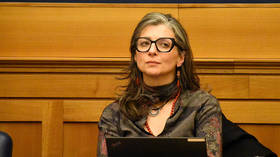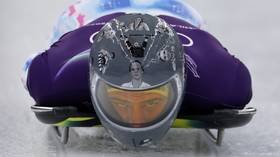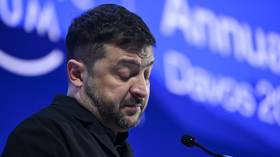Europe and Ukraine: A tale of two elections
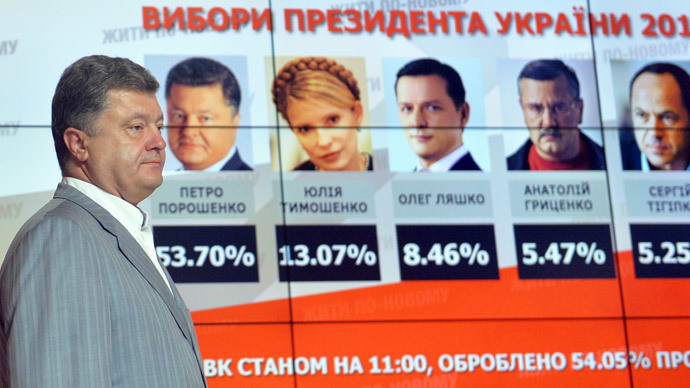
Circumstances surrounding the European and Ukrainian elections were far from being a mere coincidence.
The regime changers in Kiev decided to hold a presidential election on May 25, the same day as European Parliament elections, in order to demonstrate their desire to follow a European-centric foreign policy.
Talk about two elections somewhat joined at the hip! In the end, the Ukraine election did actually represent European foreign policy in action – manifested in regime change leading to the specter of civil war.
Few in Europe would have noticed how this process is so far away from “democracy” –instead enshrining intolerance and an ideology of blind confrontation, as represented by this “debate” in Kiev driven by a clueless Yale historian.
Key facts that should be understaood are how the West ignored the Odessa massacre, as well as the detention of Russian journalists; and how the West dismissed the aspirations of eastern and southern Ukrainians as the work of “pro-Russians” or “terrorists.” These people simply became objects of repression - fully supervised by the West, with now the whole regime change theatre of the absurd in Kiev legitimized through an election charade.
Way beyond the established fact of an Atlantic push against Russian western borderlands, Ukraine remains a catfight of local oligarchies. No wonder the new Ukrainian president is also an oligarch; the 7th wealthiest citizen in the land, who owns not just a chocolate empire, but also automotive plants, a shipyard in Crimea and a TV channel. The only difference is that he’s a NATO oligarch
It’s the economy, stupid
Meanwhile, in NATOstan, local and transnational elites have been desperately trying to spin a measure of success. Abstention remains notable – only roughly 4 in 10 Europeans take the trouble to vote on what goes on in Strasbourg, with a majority alienated enough to legitimize the mix of internal European austerity and international belligerence.
Yet the vote on Sunday went way beyond “anti-establishment,” nationalist – and frankly xenophobic or even fascistic – parties consolidating the rejection of “more EU.”
Hardly discussed in the pre-vote campaigns were the Snowden NSA revelations; the shady negotiations between Washington and Brussels over a free trade agreement which will be a boon for US Big Business; and how the financial casino supervised by the European Central Bank, the IMF, and the European Commission (EC) will remain untouched, further ravaging the European middle classes.
The anti-EU crowd performed very well in France, the UK, Denmark and Greece. Not so well in Italy and the Netherlands. The mainstream did relatively well in Germany and ultraconservative Spain – even though losing votes to small parties.

In Italy, the ruling Democratic Party of current Prime Minister Matteo Renzi did very well (almost 41 percent). The Italian Tony Blair keeps promising a vague “radical reform” – whatever that means. As for the anti-establishment 5 Star party of comedian Beppe Grillo, it lost a lot of votes.
In regions such as northwest France, which includes Normandy – a traditional bastion of the Left – Marine Le Pen’s National Front got a whopping 32.6 percent of the vote. With Francois Hollande’s pathetic socialists in power, Le Pen could not but have the last laugh.
And that duly prompted a portentous intellectual nullity such as the former executive editor of the International Herald Tribune to roar that Marine Le Pen is the French Vladimir Putin.
Essentially, European voters said two things out loud: either “the EU sucks,” or “we couldn’t care less about you, Eurocrat suckers.”
As if that sea of lavishly pensioned Brussels apparatchiks – the Eurocrats - would care. After all, their mantra is that “democracy” is only good for others (even Ukrainians…) but not for the EU; when the European flock of sheep votes, they should only be allowed to pick obscure Brussels-peddled and Brussels-approved treaties.
Brussels, anyway, is bound to remain the Kafkaesque political epitome of centralized control and red tape run amok. No wonder the EU is breathlessly pivoting with itself as the global economy relentlessly pivots to Asia.
Follow the money
To believe that an EU under troika austerity will bail Kiev out of its massive outstanding debts is wishful thinking. The recipe - already inbuilt in the $17 billion IMF “rescue” package is, of course, austerity.
Oligarchs will remain in control, while assorted plunderers are already lining up. Former US Secretary of State Madeleine Albright – for whom hundreds of thousands of Iraqi children were expendable – “observed” the elections, and most of all observed how to privatize Telecom Ukraine, as she is doing now with Telekom Kosovo.
There’s no evidence Right Sector and Svoboda will cease to be crypto-fascist, racist and intolerant just because Poroshenko – the King of Ukrainian Chocolate – is now the president. By the way, his margin for maneuver is slim, as his own markets – not to mention some of his factories – are in Russia. Heavy industry and the weapons industry in eastern Ukraine depend on Russian demand. It would take at least a whopping $276 billion for the West to “stabilize” eastern Ukraine. The notion of the EU “saving” Ukraine is D.O.A.
Moscow, once again, just needs to do what it is doing: nothing. And make sure there will be no economic or political help unless a federalized – and Finlandized - Ukraine with strong regions sees the light of day.
Even the Brookings Institution has reluctantly been forced to admit that the US neo-con gambit has failed miserably; there’s no Ukraine without Russian help.
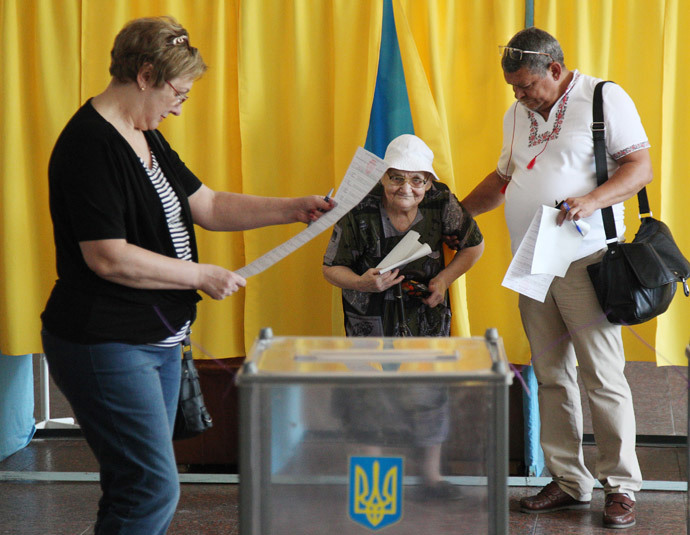
So it’s up to the Chocolate King to prove himself a leader of all Ukrainians, and only then will he have a shot at entente cordiale with – and even help from - Moscow.
Signs so far are mixed. Poroshenko said Ukraine could “possibly” become an EU member state by 2025 (it won’t happen). He ruled out entering NATO (wise move). He rejects federalization (dumb move). He believes that with a strong economy Crimea would want to be back (wishful thinking). Still, he believes in reaching a compromise with Moscow (that’s what Moscow always wanted, even before regime change).
What a mess
Back in NATOstan, there’s the crucial point of what happens to the ultra-right-wing anti-EU brigade in the Parliament in Strasbourg. They may all abhor the EU, but the fact is this ideological basket case will hardly form an alliance.
An alliance would mean at least 25 Parliament members coming from at least 7 different countries. Marine Le Pen has already stepped into the ring. She has an agreement with the nasty Geert Wilders in the Netherlands, and could also count on the Austrian FPO and the Belgian Vlaams Belang. The Swedish Democrats – which are in fact crypto-Nazis – are sitting on the fence. The Greek neo-Nazis of Golden Dawn and the Hungarian Jobbik are out. As for UKIP, they definitely don't see themselves as part of this “family.”
What this ultimately means is that conservative and moderate parties, as per the status quo, will remain in control, expressed via an extremely likely coalition of the European People’s Party (center-right) and the Socialists and Democrats (center-left).
What comes next, in the second half of 2014, is the appointment of a new EU Commission. That’s Kafka redux, as in the bureaucrat-infested executive arm of the EU, which shapes the agenda, sort of (when it’s not busy distributing subventions in color-coded folders for assorted European cows.)
There are 5 candidates fighting for the position of EC president. According to the current EU treaty, member states have to consider the result of EU Parliament elections when appointing a new president. Germany wants a conservative. France and Italy want a socialist. So expect a tortuous debate ahead to find who will succeed the spectacularly mediocre Jose Manuel Barroso.
The favorite is a right-winger of the European People’s Party, former Prime Minister of Luxembourg Jean-Claude Juncker. He is an avid defender of banking secrecy while posing himself as a champion of “market social economy.”
Then there’s more Kafka: choosing the new president of the EU Council and the High Representative for Foreign Affairs. Translation: the EU won’t decide anything, or “reform” anything for months. That includes the critical negotiations with the Americans over the free trade deal.
It’s absolutely impossible to spin these Sunday elections as not discrediting even more the EU project as it stands.
As I’ve seen for myself, since early 2014, in 5 among the top EU countries, what matters for the average citizen is as follows: how to deal with immigration; how to fight the eradication of the welfare state; the implications of the free trade agreement with the US; the value of the euro –including an absurdly high cost of living; and what the ECB mafia is actually doing to fight unemployment.
With Kafka in charge for the foreseeable future, what’s certain is that Paris and Berlin will drift further and further apart. There will be no redesign of the EU’s institutions. And the next Parliament, filled with sound and fury, will be no more than a hostage of the devastating, inexorable political fragmentation of Europe. “Saving” Ukraine? What a joke. The EU cannot even save itself.
The statements, views and opinions expressed in this column are solely those of the author and do not necessarily represent those of RT.
The statements, views and opinions expressed in this column are solely those of the author and do not necessarily represent those of RT.




